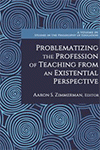
Problematizing the Profession of Teaching from an Existential Perspective
Edited by:
Aaron S. Zimmerman, Texas Tech University
A volume in the series: Studies in the Philosophy of Education. Editor(s): John E. Petrovic, The University of Alabama.
Published 2022
Teachers not only serve as caretakers for the students in their classroom but also serve as stewards for society’s next generation. In this way, teachers are charged with responsibility for the present and the future of their world. Shouldering this responsibility is no less than an existential dilemma that requires not only professional solutions but also personal responsibility rooted in subjective authenticity. In the edited volume, authors will explore how the philosophy of Existentialism can help teachers, teacher educators, educational researchers, and policymakers better understand the existential responsibility that teachers shoulder.
The core concepts of Existential philosophy explored in this edited volume imply that a teacher’s lived experience cannot be defined solely by professional knowledge or dictates. Teachers have the capacity to create subjective meaning through their own agency, and there is no guarantee that those subjective meanings will accord with professional dictates. Furthermore, there is no guarantee that professional dictates are more valid than the existential realities of individual teachers. The philosophy of Existentialism encourages individuals to reflect on the existential realities of isolation, freedom, meaninglessness, and death in an effort to propel individuals towards more authentic ways of engaging in the world. The chapters of this edited volume advance the argument that being and becoming a teacher must be understood – at least in part – from the subjective perspective of the individual and that teachers are responsible for authoring the meaning of their lives and of their work.
ENDORSEMENTS:
"At a time when the purpose of education is increasingly conceived in terms of attaining skills necessary for the job market, and teaching and learning are assessed in terms of objective outcomes, this collection of fresh essays on the existential dimension of education as an institution offers an indispensable corrective. In wide-ranging reflections on the professional and inter-personal aspects of education, the authors show how existentialism’s emphasis on subjectivity, authenticity, and lived experience can enrich our thinking about teaching and learning and improve our practices in the classroom as it exists now. Any educator seriously interested in his or her profession will find timely insights in this thoughtfully conceived volume."
— Steven Crowell, Rice University
Historically, education and educational science have been torn between, on the one hand, ideas stressing technical rationality, efficiency, and evidence-based approaches and, on the other hand, ideas highlighting the need for deeper understandings and imaginative orientations. In the light of these trends, the book Problematizing the Profession of Teaching from an Existential Perspective is a fresh contribution that offers new insights to the field of teacher professionalism and teacher development. I recommend this book to everyone who is interested in gaining a deeper understanding of what it means to be and become a teacher.
— Silvia Edling, University of Gävle
CONTENTS
Preface — Considering Teaching and Teacher Development from an Existential Perspective: An Introduction, Aaron S. Zimmerman. SECTION I: EXISTENTIALISM AND CURRICULUM AND INSTRUCTION. Possibility and Rebellion in Sartre and Camus: Existential Possibilities for Education, James M. Magrini and Elias Schwieler. Learning Objectives Reconsidered in Light of Existential-Phenomenology and Mindfulness, Glen L. Sherman. A Precious Darkness: Utilizing Existential Loneliness to Achieve Culturally Relative Self-Actualization in the Classroom, Christopher Kazanjian and Sandra Kazanjian. SECTION II: EXISTENTIALISM AND ASSESSMENT. Under Observation: Student Anxiety and the Phenomenology of Remote Testing Environments, Tyler Loveless. Assessments of Ambiguity, Steven J. Fleet. SECTION III: EXISTENTIALISM AND TEACHER DEVELOPMENT. Kierkegaard and the Power of Existential Doubt in Teaching: Transformation of Self and Profession, Dan Riordan, Paul Michalec, and Kate Newburgh. Rational Communication in University Education: A Jaspersian Theory, Daniel Adsett. Foundations of Education: Absurdity and Ambiguity, Stephanie Schneider. SECTION IV: THE TEACHING OF EXISTENTIALISM. Agency Precedes Essence: Existentialism, Ecology, and the New Materialisms, Daniel O’Dea Bradley. Teaching Is … Other People: Existential Reflections on Coteaching Phenomenology With Undergraduate Students, Lauren Manton, Brigid Flaherty, Cecelia Little, and Peter Costello. About the Authors.
-
Paperback978-1-64802-944-8
Web price: $45.04 (Reg. 52.99)
-
Hardcover978-1-64802-945-5
Web price: $80.74 (Reg. 94.99)
- eBook978-1-64802-946-2

-
 Blame Teachers
The Emotional Reasons for Educational Reform
Blame Teachers
The Emotional Reasons for Educational Reform
-
 Conceptualizing Truth
Implications for Teaching and Learning
Conceptualizing Truth
Implications for Teaching and Learning
-
 Dystopia & Education
Insights into Theory, Praxis, and Policy in an Age of Utopia-Gone-Wrong
Dystopia & Education
Insights into Theory, Praxis, and Policy in an Age of Utopia-Gone-Wrong
-
 Love in Education & the Art of Living
Love in Education & the Art of Living
-
 Teaching is a Human Interaction
How Thoughtful Educators Respond, Are Responsive, and Take Responsibility
Teaching is a Human Interaction
How Thoughtful Educators Respond, Are Responsive, and Take Responsibility
-
 Technologies of Government
Politics and Power in the "Information Age"
Technologies of Government
Politics and Power in the "Information Age"
-
 The Fear Problematique
Role of Philosophy of Education in Speaking Truths to Powers in a Culture of Fear
The Fear Problematique
Role of Philosophy of Education in Speaking Truths to Powers in a Culture of Fear

